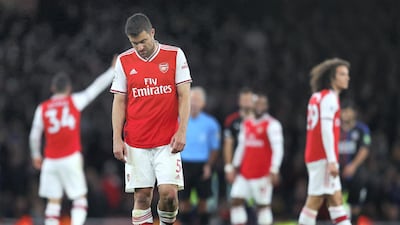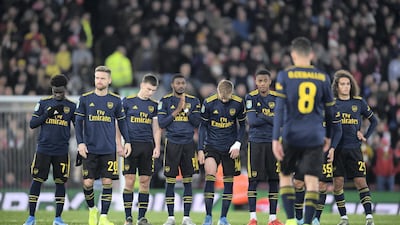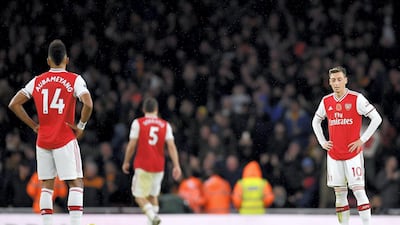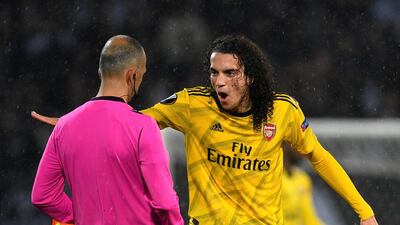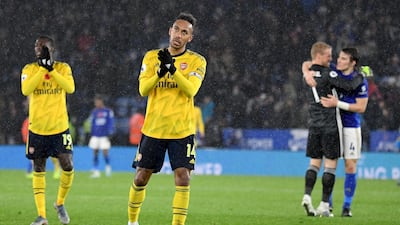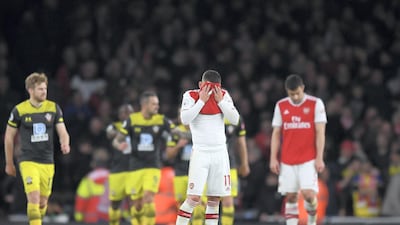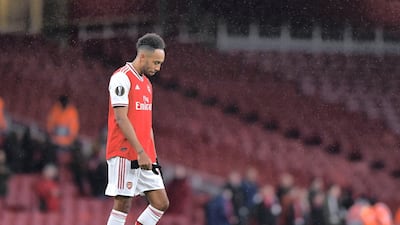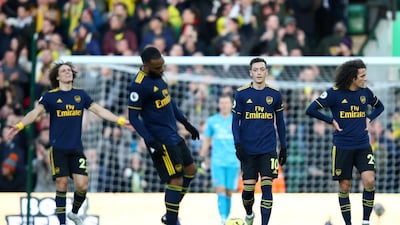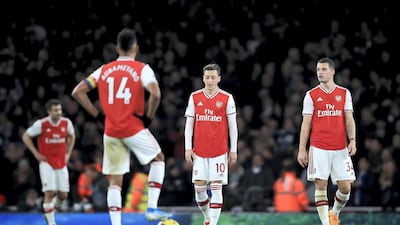Arsenal, England’s third most successful football club, haven’t won a Premier League game for two months. They haven’t won in nine in all competitions, their worst run since 1977.
They boast a modern 60,000 seater stadium, world class footballers, a billionaire owner, London location and a rich history. It matters not.
Their last match, a 2-1 home defeat to Brighton, saw them slip to 10th in the table. Arsenal have not finished below sixth since 1995. They concede too many goals; they're using a caretaker manager, Freddie Ljungberg, and their fans are at odds with each other.
“I seriously dislike the atmosphere at Arsenal games at the moment,” explained Paul, a 56-year-old season ticket holder. “There are people not worried about supporting their team, more about having the chance to criticise players. The Granit Xhaka thing was just awful [when he was booed by Arsenal fans recently]. He didn’t have a worse game than anyone else, he didn’t get himself off the pitch quickly but there have been groups in our fanbase out to get him for weeks.
"They don’t think he’s good enough but the whole team isn’t good enough. You have to support what you have, not destroy your own players. They did it with [Shkodran] Mustafi, they have to have a scapegoat. If it’s not the manager then it’s one of the players. It has crept in hugely over the last few years and it goes with having a struggling team.”
Fans being frustrated at their team is nothing new. Social media is packed with anonymous poison, yet unlike at Old Trafford where Manchester United fans remain supportive of their manager, at Arsenal it permeates inside the stadium during matches.
“There are a lot of people at games who are not proper fans,” says Paul. “They’re fans of Arsenal winning and because we won for so long, that was fine. But we’ve been spoiled for years. I remember sitting there at Highbury watching all those wonderful players under Arsene Wenger and thinking ‘remember this because it’s not always going to be like this’. That has been true and a lot of people just can’t cope with it.”
There are other issues. Paul pays £1,200 (Dh5,791) for his season ticket. “We sit above the away fans, we’re surrounded by tourists. They’re in London, they want to see a big game, they come to Arsenal. They wear half and half scarves but the support is transient and doesn’t help build atmosphere. It’s like going to the theatre. If the team entertain you then the fans will get behind them.”
Outside the Arsenal tube station, three men are starting to sell the Gooner fanzine, now in it's 31st year. They too speak of their frustration with their club, with their own fans but of their undying support also.
Arsenal fan TV has risen on the back of Arsenal’s problems, with supporters venting their spleen after games. “Away fans are watching it and laughing at Arsenal fans losing it,” says one. “It’s very critical, there’s not a lot of support for the team on those channels.”
By the two-metre high ARSENAL letters, leaflets are handed out for the Labour party ahead of a UK general election. Labour leader Jeremy Corbyn is an Arsenal fan who has long attended matches. “It’s time for real change,” states the leaflet. The same could have been said about Arsenal, but only the managers are being changed.
The teams walk out and there are empty seats all over the Emirates, yet the attendance is given as 60,164 – a sell out. There are not 60,000 people inside the stadium. Ljungberg tried to lift the mood by praising fans in his programme notes and the club played Andy Williams Can't Take My Eyes Off You which fans once sung for their Swedish player, but it made little difference.
“Is this a library?” sing some of the 3,000 Brighton fans as their team go on the attack from the start. There’s nothing new in those chants at Arsenal: the Emirates has never been a cauldron. It has actually become more heated as the team have slipped. After winning their opening two games and occupying third after eight matches, Arsenal haven’t won in the Premier League since beating Bournemouth on October 6.
A recent home defeat to Eintract Frankfurt in the Europa League saw large scale dissent. That poor run cost Emery his job, but Arsenal are facing a Brighton side who had lost their three previous games. They hope the tide will turn. It doesn’t.
Boos echo around the Emirates as Brighton lead 1-0 at half time. The fans try to rally in the second half. “Arsenal!” they sing. They're rewarded with a goal from Alexandre Lacazette. A cheer goes up for a second Arsenal goal from, but it’s replaced by a bellows from the away fans as VAR rules no goal.
There’s in-fighting among home fans and one is escorted out by stewards. As he goes, Brighton score. Arsenal fans start to stream out. The TV cameras focus on a girl in an Arsenal scarf and hat shouting and shaking her head. There are boos at the final whistle from the home fans while the away fans applaud their manager.
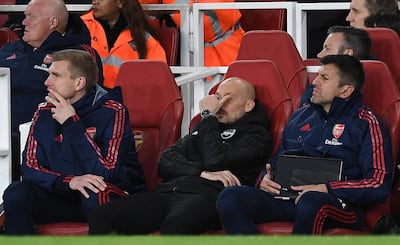
With Arsenal managing only four wins in the league, no top-10 team has conceded more than their 23 goals. They are five points clear of the relegation zone and 10 off the top four. They have not finished outside the top six since 1995, the year before Arsene Wenger joined. His legacy, like that of Alex Ferguson at Manchester United, still hangs heavy over the current gloom.
On the other side of the stadium by the Tony Adams statue, the football author James Brown is waiting. “You’ve just missed a huge argument,” he says. “They’re all turning on each other. They were during the game, too.
“Fans of the same club fighting with each other is because they’re totally powerless about the situation. When you invest a huge amount of emotion into work or family you can influence the situation. You can’t influence your football team. Players scoring great goals aren’t dependent on whether the crowd are chanting or not.
"Football is a chance for fans to air their frustrations. When people join the mob or a crowd they suspend their individual personality, morals and principles. They becomes invisible within the crowd so they can unleash everything yet when things aren’t going the way you want them to, you still don’t get anything positive back.
“I sat next to a man who spent 14 years waiting for a season ticket. When he got one, it wasn’t to see the team he’d put the money down for.”
Brown has another theory. “There’s a soft middle class complacency about Arsenal. It's like going to the theatre. A man near me tonight was shouting: ‘I’m sick of this’. You can see the difference in the health and the wealth between fans at grounds in Manchester, Leeds or Newcastle and the more affluent fans at Chelsea or Arsenal. You see the difference in the clothes, the amount of hair and waistlines. When Arsenal conceded the second goal tonight there were still 15 minutes to go, yet thousands started streaming out. They’ve been spoilt.”
Meanwhile fans queue to voice their opinions on the soapbox of Arsenal fans TV, angry contorted faces. The angrier they are, the more they are viewed, the more money is paid out for adverts. It’s voyeurism fed by algorithms who don’t encourage nuance and balance.
“I’ve changed my opinion on them,” says Paul. “I think they speak for more of the fan base than you would imagine. They genuinely want the best for the team and the club, but we’re suffering from past successes. The end of the Wenger era wasn’t handled well and nor has the succession been."
Paul’s not giving up yet. “I still enjoy going to game, but nowhere near as much as I once did. But you have to support your team through thick and thin.”
Arsenal are a great football club, but not just now.
